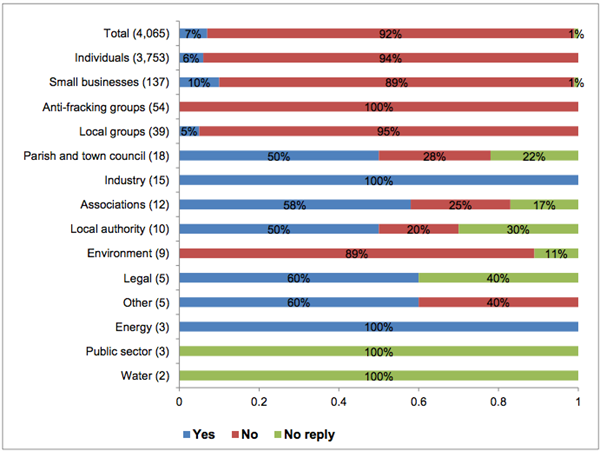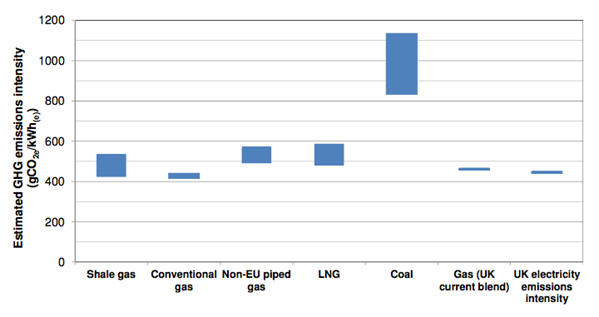Simon Evans
26.09.2014 | 1:45pmFracking firms could benefit by up to £105 million a year from a legal change that is being pushed through despite overwhelming public opposition.
The Department of Energy and Climate Change (DECC) has long had plans to change the law so that drilling for shale gas deep under peoples’ properties is no longer considered trespass.
Yesterday it said it would go ahead despite the opposition of 99 per cent of those responding to a public consultation on the plans.
Trespass no more
To extract shale gas from deep under the UK, firms plan to drill into shale rocks and then split them apart with high-pressure water, chemicals and sand. This takes place at depths at least several hundred meters below the surface.
Under current law, drilling fracking wells under peoples’ homes constitutes trespass. This would not prevent fracking from taking place. But it would entail a potentially lengthy legal process that would be expected to lead to compensation for landowners. Case law suggests this compensation would be relatively minimal.
The government held a public consultation until mid-August on plans to change the law to speed up the process. It would formalise a standard compensation package for communities affected by drilling.
DECC received 40,647 responses. Just 0.7 per cent of responses (285) were in favour of easing the rules for shale gas drilling with over 99 per cent opposed and a small number undecided.
DECC undertook a detailed consultation analysis that excluded 36,582 of the responses because they were from organised anti-fracking campaigns run by green NGOs or because they were duplicates.
But even discounting these submissions, opposition to the proposal (red bars, below) remains overwhelming. 92 per cent of non-organised responses were against. That’s 94 per cent of individuals and 90 per cent of small firms.
The only significant support for the fracking trespass change (blue bars) came from 15 industry organisations, three in the energy sector, three legal outfits, 14 councils and seven professional associations.

Source: DECC consultation response
A separate YouGov poll conducted in May found the legal change was opposed by 74 per cent of the public.
DECC’s response to the consultation explains why it will go ahead with its plans despite all this opposition.
It says:
“We acknowledge the large number of responses against the proposalâ?¦ We recognise that there is opposition to hydraulic fracturing and the use of fossil fuels in general. The consultation was not intended to address this wider issue, and focussed specifically on underground access.”
Shale gas could help improve energy security, create jobs and help meet carbon targets, DECC says. The objections received to the consultation did not persuade it to change its mind.
Changing the trespass rules will provide a benefit of up to £105 million per year to fracking firms, DECC’s analysis shows. This analysis also finds zero net effect on emissions, even though it would increase the amount of shale gas extracted.
That’s because DECC expects shale gas to displace gas imported from overseas rather than increasing the amount burned overall.
DECC’s press release initially called shale gas “the cleanest fossil fuel”. This statement does not appear supportable, however. A major study for DECC found electricity from shale gas would have similar or higher emissions compared to using conventional gas from the North sea, as the chart below shows:

Source: DECC report ” Potential Greenhouse Gas Emissions Associated with Shale Gas Extraction and Use“
A DECC spokesman tells Carbon Brief the government’s position is that gas in general is the cleanest fossil fuel, not just shale gas. DECC subsequently amended its release by deleting the word “shale”. It now says that gas is the cleanest fossil fuel.
This makes more sense – emissions from gas-fired electricity are roughly half those from coal. That’s why energy minister Matt Hancock and some others say shale gas can be a clean ‘bridging fuel’ away from coal on the road to a low-carbon future. Others argue that, on the contrary, methane leaks during extraction make shale gas dirtier than coal.
According to the Committee on Climate Change shale gas is better than coal as long as the leakage rate is below 11 per cent. We’ve taken a detailed look at the arguments over fugitive methane here.
Could a UK shale revolution reduce the country’s emissions overall? Not according to the government. The CCC says the UK power sector must be essentially decarbonised by 2030, so there’s a limited window in which to use gas without adding expensive carbon capture and storage.
The Intergovernmental Panel on Climate Change concluded earlier this year that shale gas could play a role in the global decarbonisation effort – but only if it is carried out in a controlled way, used as a substitute for higher-emitting coal, and with emissions from the energy sector as a whole shrinking rapidly towards zero by mid-century.
Update 14.12: We added a sentence to the piece after DECC amended its press release.

